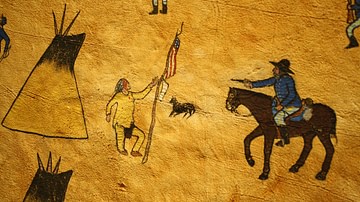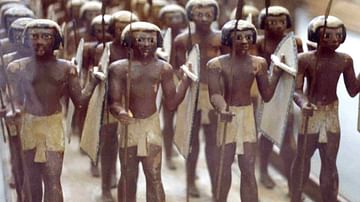Search
Search Results

Definition
Red Cloud's War
Red Cloud's War (1866-1868) was a conflict between the Lakota Sioux-Cheyenne-Arapaho alliance and the US government over the westward expansion of the United States into the Powder River territory. It was the only war won by the Plains Indians...

Definition
Mount Sinai
Mount Sinai (Hebrew: Har Sinay, Arabic: Jabal Musa, "mountain of Moses") is a holy site for the three Abrahamic religions: Judaism, Islam, and Christianity. It has traditionally been located in the center of the Sinai Peninsula, between Africa...

Definition
Treaties of Tilsit
The Treaties of Tilsit were two peace treaties signed in July 1807 by Emperor Napoleon I of France (r. 1804-1814; 1815) and the monarchs of Russia and Prussia in the aftermath of the Battle of Friedland. The treaties ended the War of the...

Definition
Red Cloud
Red Cloud (Makhpiya-luta, l. 1822-1909) was an Oglala Lakota Sioux chief, statesman, and military strategist who became the only Native American leader of the Plains Indians to win a war against the United States. Red Cloud's War (1866-1868...

Definition
Sand Creek Massacre
The Sand Creek Massacre (29 November 1864) was a slaughter of citizens of the Arapaho and Cheyenne nations at the hands of the Third Colorado Cavalry of US Volunteers under the command of Colonel John Chivington, resulting in casualties estimated...

Definition
Zakutu
Zakutu (l. c. 728 - c. 668 BCE) was the Akkadian name of Naqi’a, a secondary wife of Sennacherib of Assyria (r. 705-681 BCE). Though she was not Sennacherib's queen, she bore him a son, Esarhaddon, who would succeed him. She may have ruled...

Definition
Ancient Syria
Syria is a country located in the Middle East on the shore of the Mediterranean Sea and bordered, from the north down to the west, by Turkey, Iraq, Jordan, Israel, and Lebanon. It is one of the oldest inhabited regions in the world with archaeological...

Article
Weapons in Ancient Egypt
The ancient Egyptian military is often imagined in modern films and other media as a heavily armed and disciplined fighting force equipped with powerful weapons. This depiction, however, is only true of the Egyptian army of the New Kingdom...

Definition
League of Nations
The League of Nations was founded in January 1920 to promote world peace and welfare. Created by the Treaty of Versailles, which formally ended the First World War (1914-18), the League provided a forum where nations promised to resolve international...

Definition
Sea Peoples
The Sea Peoples were a confederacy of naval raiders who harried the coastal towns and cities of the Mediterranean region between c. 1276-1178 BCE, concentrating their efforts especially on Egypt. They are considered one of the major contributing...